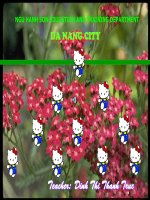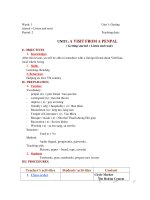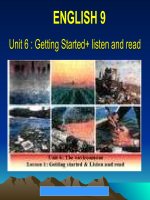UNIT 10 GETTING STARTED LISTEN AND READ
Bạn đang xem bản rút gọn của tài liệu. Xem và tải ngay bản đầy đủ của tài liệu tại đây (551.86 KB, 16 trang )
<span class='text_page_counter'>(1)</span><div class='page_container' data-page=1></div>
<span class='text_page_counter'>(2)</span><div class='page_container' data-page=2>
Lesson2: Speak – Listen
Unit 10:
<b>LIFE ON OTHER PLANETS</b>
</div>
<span class='text_page_counter'>(3)</span><div class='page_container' data-page=3>
<b>Word square:</b>
S E A R T H
M U M E R C
U R N S A U
S S R U B R
A A R V C Y
</div>
<span class='text_page_counter'>(4)</span><div class='page_container' data-page=4></div>
<span class='text_page_counter'>(5)</span><div class='page_container' data-page=5>
Which planet is the nearest to the sun?
Which is the biggest?
</div>
<span class='text_page_counter'>(6)</span><div class='page_container' data-page=6>
a) Vocabulary:
microorganism (n)
Vi sinh v t
ậ
gemstone (n)
Đ
aù q
sparkling (a)
Lấp lánh
creature (n)
Sinh vật
trace (n)
Dấu vết
</div>
<span class='text_page_counter'>(7)</span><div class='page_container' data-page=7>
b) Model sentences:
There might be water on Mars.
This may be gas on Mars.
Form: May
Might
+
V. infinitive
</div>
<span class='text_page_counter'>(8)</span><div class='page_container' data-page=8>
minerals
microorganism
plants
gemstones
little creatures
water
</div>
<span class='text_page_counter'>(9)</span><div class='page_container' data-page=9>
a) What’s this?
This may be ……….on Mars.
b) What are they?
They might be ………..on Mars.
</div>
<span class='text_page_counter'>(10)</span><div class='page_container' data-page=10></div>
<span class='text_page_counter'>(11)</span><div class='page_container' data-page=11>
a) Making dialogue:
Your friend: There may be mountains on Mars.
You : What do these drawings say?
Your friend: Well, they may be gas on Mars.
You : And what about the red signs
on the left corner?
b) Discussion:
What may there be on Mercury / on the moon?
</div>
<span class='text_page_counter'>(12)</span><div class='page_container' data-page=12>
<b>2. Listen:</b>
a) Vocabulary:
expert (n)
Chuyeân gia
crater (n)
Hố, miệng núi lửa
one-sixth
Một phần sáu
</div>
<span class='text_page_counter'>(13)</span><div class='page_container' data-page=13>
<b>Set the scene: you will listen to the description of the moon.</b>
<b> But before listening, you should read these statements </b>
<b> and guess which is correct and which is incorrect.</b>
</div>
<span class='text_page_counter'>(14)</span><div class='page_container' data-page=14>
Questions:
a) Why are there no sound on the moon?
b) How many creature are there on the moon?
c) How much will you weigh on the moon if you weigh
50 kilos on the earth?
c) Will you sleep very well on the moon? why/? Why not?
Because there is no air on the moon.
There are about 30,000 creatures on the moon.
If I weigh 50 kilos, I’ll weigh only a little more than kilos.
No, we won’t. Because one day lasts for two weeks
</div>
<span class='text_page_counter'>(15)</span><div class='page_container' data-page=15>
Tape transcript:
<b>Good evening. Welcome to our Science For Fun Program. This week, we’ve</b>
<b> received a lot of questions asking about life on the moon.</b>
<b>We’ve talked to some experts and this is what we’ve found out. There is no </b>
<b>Water or air on the moon. It is all silent because there is no air. Of course, </b>
<b>there will be no music, no sounds. There are no rivers and no lakes. At night, </b>
<b>it is very cold. The temperature goes down 1510 C below zero. But during </b>
<b>the day the temperature </b>rises<b> to 1000<sub> C above zero.</sub></b>
<b>There are great round holes on the moon. They look like big lakes. They are</b>
<b> called craters. There are more then 30,000 craters on the moon. There are </b>
<b>also high mountains. The highest mountains on the moon are about 26,000 feet </b>
<b>or 8,000 meters high.</b>
<b>And here is something very interesting to know: on the moon you weigh </b>
<b>one sixth of what you weigh on earth. If you weigh 50 kilos, on the moon</b>
<b> you will weigh only a little more than 8 kilos. You will be able to jump very high, </b>
<b>even higher than an Olympic Champion. You can take very long steps as well.</b>
<b>And … may be you want won’t sleep very well because one day on the moon</b>
<b> lasts for 2 weeks.</b>
</div>
<span class='text_page_counter'>(16)</span><div class='page_container' data-page=16>
HOMEWORK:
Learn by heart new words.
</div>
<!--links-->









